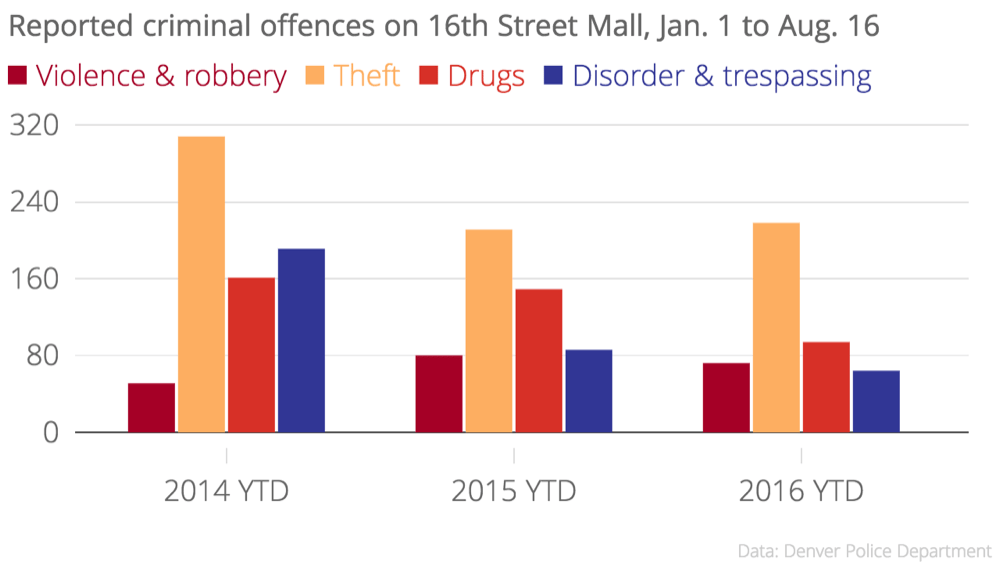If the 16th Street Mall has a crime problem, it hasn't changed much in the last few years.
We reviewed the criminal offenses reported at 16th Street addresses over the last few years and found that violent crime is essentially stable, while police are issuing significantly fewer criminal charges for drug possession and "anti-social" behaviors, such as public urination.
There are a few ways to read this. Chew on this chart for a second, which examines the same time period for each year. Then we'll pile on some context.

First, a note on my approach
I chose to examine only the period from Jan. 1 to Aug. 16, for each of the years, so that we could get a sense of how 2016 is looking so far. So, each time I say "2014," I'm really talking about the first 7.5 months of 2014.
I didn't go earlier than 2014 because of some difficulties with how the data is structured. Lt. Robert Wyckoff of the Denver Police Department says officers have encountered more homeless and "traveling" people on the Mall since marijuana was legalized in 2014.
Unfortunately, this chart doesn't go back far enough to assess the change that happened with legalization – but Wyckoff does see the numbers as proof that Denver police has managed to keep crime rates stable even with the proliferation of marijuana.
The department's data-analysis unit has found similar results to what this chart shows, according to records administrator Mary Dulacki.
Let's break out these categories.
In "violence and robbery," I've included both aggravated and simple assault, plus all forms of robbery. Robbery is when you use the threat of force to take something. For each one, the number of 16th Street offenses increased from 2014 to 2015, and then dropped to somewhere in between for 2016.
In "theft," I've got burglary, larceny and auto theft. Larceny is the most common category of offense on 16th Street, and shoplifting is particularly popular.
"Drugs" includes both possession and selling. As you can see, almost all drug offenses have declined on 16th Street over the last few years. For example, only 34 liquor-possession offenses have been reported this year, compared to 75 in the 2015 period.
However, this "drugs" number does not include the lowest-level public marijuana possession offenses. Those aren't crimes. So, this data doesn't address whether or not more people are getting busted for pot.
Then there's the most dramatic change.
I've lumped together a lot of "quality of life" offenses in "disorder and trespassing."
Some of these have stayed pretty stable. "Disturbing the peace," for example, is practically the same this year as in 2014. Many of them bumped up in 2015 and are falling this year.
The big change is a dramatic reduction in the number of "other public order" offenses, which have fallen almost 90 percent compared to 2014. This category includes acts such as public urination and panhandling.
Only 18 of these offenses showed up in this year's data. Wyckoff, the lieutenant, says this is because the situation really is changing.
"We’re seeing fewer and fewer of those public order crimes -- much fewer today than what we saw a year ago this time," he said.
Over the summer, the force has had "seven days a week of high visibility patrol during specific hours on the Mall," he said. He also credited the Downtown Denver Partnership and its new private security force.
On urination, specifically: "We had complaints from citizens and business owners that the alleys smelled terrible. We’ve worked with public works, with other agencies, to identify ways to really limit the opportunities and possibilities for somebody to get to the alleys."
Still, I asked whether it might be that officers were simply taking a softer approach.
Are they giving people a warning rather than a criminal charge? A lot of people have argued that it's not worth filling up jails with people for minor offenses.
Wyckoff said that the department is trying to put people in touch with services, rather than just "shooing them on," but he denied that there was a directive to specifically avoid arrests on 16th.
"The officers have discretion to charge somebody, or to write a ticket," he said. "And if the officers feel that it’s necessary, they can put somebody in jail."
We want to know: What have you seen on the Mall lately?
Fill out our survey, and come see me on Thursday. I'll be interviewing people all day at a special Denverite tent near T.J. Maxx.













